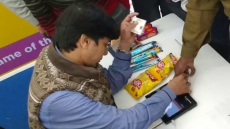Congratulating the Indian government for “shining a light on sanitation”, Bill Gates, Microsoft co-founder and co-chair of the Bill and Melinda Gates Foundation (BMGF), said India now must build on the success of Swachh Bharat Mission by using innovations and technology to improve sewage processing capabilities and generate zero waste.
“The Indian government is to be congratulated for putting a focus on sanitation because the malnutrition rates in India are substantially above what you’d expect, given the strong economic development that India’s had. And that means a lot in terms of kids not developing their full mental and physical capacity,” said Gates.
The number of deaths if children under five years declined to 8,02,000 in 2017 from around one million two years ago. Poor sanitation and unsafe water cause 88% of childhood diarrhoea, which also leads to chronic malnutrition, lowered immunity and frequent and potentially fatal infections, such as pneumonia and tuberculosis.
“The fact that the government’s really shining the light on sanitation, that’s not very common, it’s not a topic people want to talk about very much,” said Gates at the Goalkeepers event in New York that showcased the efforts made to meet the UN’s sustainable development goals and reminded the world that while progress was happening, it was not inevitable.
Since its launch on October 2, 2014, more than 86.6 million toilets have been built in India, with 513 districts and 25 states being declared open defecation free. The next step is using innovative new technologies for efficient sewage processing and management.

India needs new approaches to sanitation that include processing the millions of tonnes of faecal sludge generated and collected from pit latrines and septic tanks, which is discharged untreated into the environment.
“In urban areas, simply digging a pit doesn’t work and you don’t want to dump it into the river, you want to run it through processing. So, through partners, particularly in India and China, we now have much better processing equipment,” said Gates.
The BMGF’s Reinvent the Toilet challenge in India offered grants to innovative and financially-profitable sanitation systems with efficient biodegradation and faecal waste management. “We are seeing more capital investment in that processing capability, we’re seeing an embrace of the new technologies to help out,” he said.
These next gen toilets have to be affordable, self contained (off sewage lines), designed to destroy disease-causing pathogens, and, above all, be easy to use and maintain so people want to use them.
“In the long run, what we’d like is a toilet that essentially burns the waste without generating a big waste stream, but that’s in the five to ten-year time frame. In the meantime, we have to help all cities plan and make sure the sanitation is being taken care of,” he said.
In sum, India is on track to meet its sanitation goals, said Gates. “And so, given that this is long lead time in terms of the capital investment and the processes, I feel good about the progress that’s been made,” he said.




